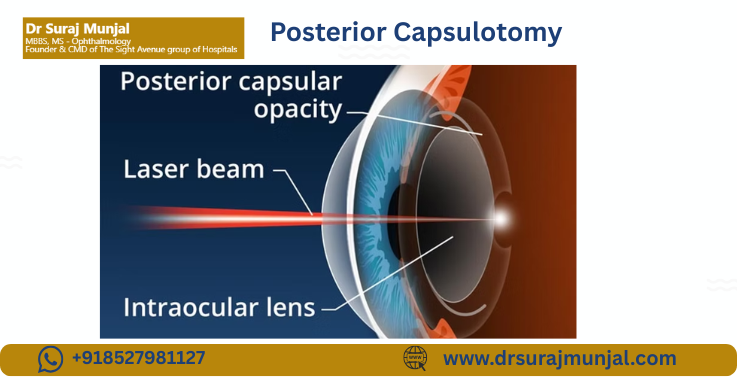Posterior Capsulotomy
Posterior Capsulotomy is a minor laser eye procedure performed to treat posterior capsule opacification (PCO), a common complication after cataract surgery. In cataract surgery, the natural cloudy lens is replaced with an artificial intraocular lens (IOL). Over time, the back of the lens capsule can become cloudy, affecting vision. Dr. Suraj Munjal, a renowned ophthalmologist, specializes in this safe and effective laser procedure to restore clear vision.
Table of Contents
Causes of Posterior Capsule Opacification (PCO)
PCO, also known as secondary cataract, is caused by the growth of residual lens epithelial cells on the posterior capsule of the intraocular lens after cataract surgery. These cells migrate, causing a gradual thickening and clouding of the capsule, which can lead to blurry vision similar to the original cataract.
Key factors include:
- Residual lens epithelial cells post-cataract surgery.
- Increased cell migration and proliferation.
- Age-related changes in the eye.
Types of Posterior Capsule Opacification
Posterior capsule opacification can be classified into two main types:
- Fibrous PCO: This involves a thickening of the posterior capsule caused by the formation of fibrous tissue.
- Elschnig’s pearls: This occurs when tiny cells cluster together, resembling pearls, creating cloudiness.
Both types can interfere with vision, requiring treatment like posterior capsulotomy.
Symptoms of Posterior Capsule Opacification
If you are experiencing PCO, the following symptoms may occur:
- Blurry vision was similar to the initial stages of cataracts.
- Glare or halos around lights, especially at night.
- Difficulty seeing in bright light conditions.
- Reduced contrast sensitivity, making it harder to distinguish objects in low light.
Diagnosis of Posterior Capsule Opacification
Diagnosing PCO involves a comprehensive eye examination by Dr. Suraj Munjal, including:
- Slit-lamp examination to view the back of the eye and detect any clouding.
- Visual acuity tests are used to assess how the PCO affects your vision.
- Pupil dilation to allow a more detailed look at the posterior capsule and the implanted intraocular lens.
Treatment of Posterior Capsule Opacification
Dr. Suraj Munjal performs a YAG laser posterior capsulotomy to treat PCO. This outpatient procedure involves using a laser to make a small opening in the cloudy posterior capsule, allowing light to pass through clearly.
Cost of Posterior Capsulotomy and Stay in India
The cost of posterior capsulotomy in India is significantly lower than in many other countries, making it a preferred destination for international patients.
Frequently Asked Questions
A posterior capsulotomy is a laser procedure used to treat clouding of the posterior capsule following cataract surgery, restoring clear vision.
Yes, it is a safe and minimally invasive procedure with a high success rate.
The entire procedure usually takes less than 15 minutes, and patients can return home shortly after.

